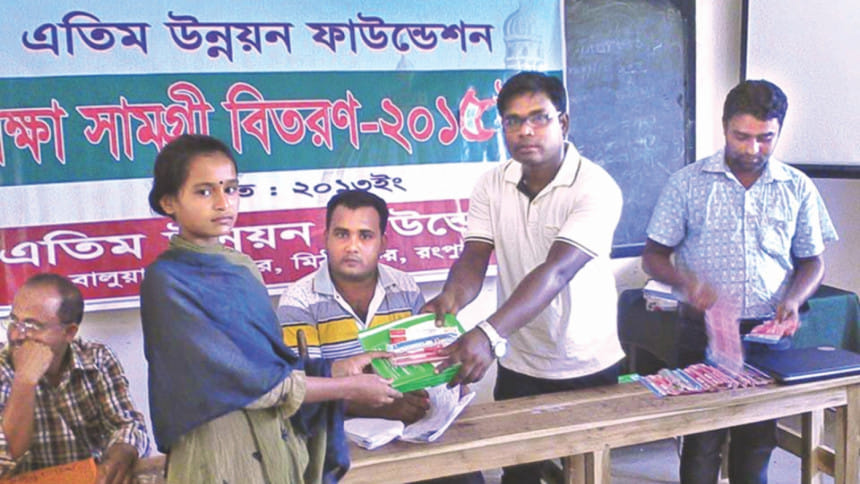Serving the orphans

Faridul Islam Farid would not want others to suffer what he went through.
After his parents died, his brothers tried to force him to give up studies and work at their family store. So, Farid had to leave home and continued studying on his own.
He tutored students and did odd jobs to fend for himself. He had to spend tiring days and sleepless nights, that too without any emotional support from the family or anywhere else. Yet, he did not give up.
"I lost my father in 1994 when I was only 7 years old. But my mother did not let me feel the odds and cares of life," says Farid of Mithapukur upazila in Rangpur.
"When she died in 2009, I got to see the harsher side of life. I had four brothers. They were hell-bent on having me quit education. But I was too determined to give in."
Now that he has been able to overcome all the obstacles and pursue higher education, Farid wants to make sure that the children around him get hassle-free access to education, something he didn't get.
And he focused on orphans especially for "they are the most vulnerable to dropping out from schools," he says.
"While studying, I felt the need to stand beside the orphans. I shared the thought with my friends. They liked the idea and gave me support."
"I told my friends that if we could save Tk 20-50 a day, we could help the orphans," said Farid, who now is studying masters at Rangpur Carmichael College.
His friends Nazmul Hossain, Firoz Kabir, Golam Kibria Sagor, Rezwanul Islam and Mohammad Tuhin joined the struggle "to establish rights of the orphans".
With the little money they saved, Farid and his friends started campaigns to make the orphans of his locality aware of their rights and encourage them to continue education "no matter what".
In 2013, he gave the initiative a name -- Etim Unnayan Foundation -- and began working on a broader scale by distributing education materials and stipends to 26 orphans of Balua Mashimpur Union in Mithapukur.
"Now no orphans of at least five unions of the upazila feel left out. They are pursuing education with great enthusiasm," says Farid.
His foundation also gives special stipends to the orphans who secure A+ in primary, junior and secondary certificate examinations.
Currently 87 orphans are being supported by the foundation.
Nawsin Nahar Liza is one of them.
The ninth grader of the local Balua High School says she gets Tk 900 every six months and all the educational materials required.
"After my father's death last year, my education became uncertain. The money I got from the foundation helped me a lot to continue my studies."
Mahidur Rahman, headmaster of Bujruk Sontoshpur Adarsha High School of the same area, said the foundation supports some 65 students of his school.
"Farid is doing what we could not. It will help bring substantial changes in the society gradually. Farid is now known as the guardian of the orphans here."
To boost its counseling campaigns, Farid has brought in some university teachers in his team.
"Now the orphans here are going to school and girls are not being married off at an early age."
In most cases, the properties inherited by the orphans of grabbed by their relatives, he says.
"If the orphans can be made aware of their rights, they will be able to move forward in their life … I dream that they will grow up, be established in life and take care of other orphans," Farid says.
But financial worries often frustrate him.
"If the government helped me in bearings the expenses, I would work for the welfare of a lot more orphans," he adds.

 For all latest news, follow The Daily Star's Google News channel.
For all latest news, follow The Daily Star's Google News channel. 








Comments